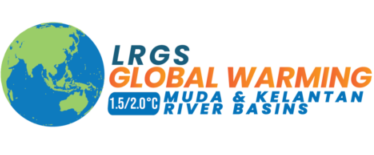Health
INTRODUCTION
The impacts of climate change on health, especially with extreme weather under global warming 1.5°C and 2.0°C, remain elusive in Malaysia. Better understanding is needed as strategic planning for extreme weather and impacts on healthcare should be sensitive to within country variations.
Starting with the Muda River Basin and Kelantan River Basin, a vulnerable region to flooding, this study compares the present condition with extreme weather scenarios under global warming 1.5°C and 2.0°C, to determine the excess deaths, cardiovascular and respiratory diseases that are attributable to the increased global temperature. This project also assesses the present condition of selected communicable diseases such as dengue, malaria, typhoid, cholera and leptospirosis and compares the projected change under global warming 1.5°C and 2.0°C scenarios. This study evaluates the concentrations of air pollutants during heat waves using conventional weather and air quality stations, with supplementary air sensors deployed around the study areas for better spatiotemporal coverage. Present and predicted air pollutants, particularly particulate matter (PM2.5), under global warming conditions, will be used to determine the impacts of air pollutants on mortality and morbidity. Statistical and measurement data are obtained from the Ministry of Health (MOH), Department of Statistics (DOS), Department of Environment (DOE), Malaysia Meteorological Department (MMD) and data assimilated from Project 1 and 2.
A heat-health warning system (HHWS) will be developed using mortality and selected meteorological data with current and projected climate scenarios from Project 1. This HHWS will be enhanced with heat-related illness (HRI) severity from selected vulnerable populations for a health-based HRI warning system. These HRI data will be obtained through field surveys which include environmental health risk assessment.
The deliverables of this project will include identification of health risk through burden of disease, regional weather and air quality prediction, climate-driven disease predictive models, health-based HRI warning system, and adaptation strategies for community resilience will be formulated.
OBJECTIVES
The overarching aim of this project is to assess the health Impacts of Global Warming 1.5°C and 2.0°C in Kelantan and Muda River Basin. Specifically, the project aims :
- To determine the vulnerable populations to weather and climate extremes under global warming 1.5°C and 2.0°C.
- To assess the interaction between weather and climate extremes under the global warming 1.5°C and 2.0°C and air quality towards impacts on health.
- To explore a climate-driven predictive model for targeted diseases.
- To quantify the health impacts risk level of weather and climate extremes under global warming 1.5°C and 2.0°C and formulate adaptation strategies.
METHODOLOGY
This project comprises three parts in assessing the impact of health on mortality and diseases related to climate change and extreme weather:
Part 1 – Burden of Disease from Air Pollution [include data from Climate Model Projection, Air Quality Model (WRF-CMAQ), Health, continuous air quality monitoring system (CAQMS) stations and AiRBOXSense smart sensors for continuous in-situ air quality monitoring]
Part 2 – Ecological study focusing on climate sensitive communicable diseases such as dengue, malaria, cholera, typhoid and leptospirosis as notified to the e-notification, Communicable Disease Control Information System (CDCIS), Ministry of Health Malaysia.
Part 3 – Focusing on Heat Related Illnesses. This involves Field study in selected vulnerable communities and environmental health risk assessment in both state as well as Projection of heat-related excess mortality.

KEY PROJECT MEMBERS

ASSOC. PROF. DR. NORFAZILAH AHMAD
Project Leader
Universiti Kebangsaan Malaysia

ASSOC. PROF. DR. ROZITA HOD
Co-Researcher
Universiti Kebangsaan Malaysia

PROF. DR. MAZURA SAHANI
Co-Researcher
Universiti Kebangsaan Malaysia

PROF. DR. JAMAL HISHAM HASHIM
Co-Researcher
Universiti Selangor (UNISEL)

PROF. DR. MOHD TALIB LATIF
Co-Researcher
Universiti Kebangsaan Malaysia

ASSOC. PROF. DR. MOHD SHAHRUL MOHD NADZIR
Co-Researcher
Universiti Kebangsaan Malaysia

DR. MUHAMMAD IKRAM A WAHAB
Co-Researcher
Universiti Kebangsaan Malaysia

DR. NORFAZRIN MOHD HANIF
Co-Researcher
Universiti Kebangsaan Malaysia

DR. MAGGIE CHEL GEE OOI
Co-Researcher
Universiti Kebangsaan Malaysia
COLLABORATORS

PUSAN MASHITAH DARUS
Government Agency Collaborator
Director of Air Division, Department of Environment Malaysia

DR. ROHAIDA ISMAIL
Government Agency Collaborator
Climate Change Unit, Environmental Health Research Centre, IMR, Ministry of Health Malaysia

DR. NORLEN MOHAMED
Government Agency Collaborator
Disease Control Division, Ministry of Health Malaysia

DR. MOHD FIRDAUS RADI
Government Agency Collaborator
Kedah State Health Department, Ministry of Health Malaysia

DR. YELMIZAITUN OSMAN
Government Agency Collaborator
Kelantan State Health Department, Ministry of Health Malaysia
STUDENTS

DR. MAZNI BAHAROM
DrPH
Thesis title: Assessment and Prediction Model of 1.5°C to 2.0°C Global Warming impact on Selected Climate-Driven Communicable Diseases in Kedah and Kelantan.
Universiti Kebangsaan Malaysia

DR. FADLI SYAH ARSAD
DrPH
Thesis title: Assessment of 1.5°C to 2.0°C Global Warming Impact on Heat-Related Illnesses: Vulnerable Groups and Health-related Heat Warning System Development.
Universiti Kebangsaan Malaysia

FAUZAN ADZIMA MOHD NASIR
PhD
Thesis title: Projected heat-related excess mortality under climate change scenarios in Kedah and Kelantan.
Universiti Kebangsaan Malaysia

MOHAMED YASREEN MOHAMED ALI
PhD
Thesis title: Assessment of Impacts of Global Warming 1.5°C and 2.0°C on Air Quality in the Kelantan and Muda River Basins.
Universiti Kebangsaan Malaysia

ZHENG YIJING
PhD
Thesis title: Assessment of Impacts of Global Warming of 1.5ºC and 2ºC on Future Air Quality in Peninsula Malaysia using Numerical Chemical Weather Prediction Model
Universiti Kebangsaan Malaysia

NORHAFIZAH BINTI KARIM
PhD
Thesis title: Projection of Global Warming 1.5°C to 2.0°C Impact to the Burden of Non-communicable diseases attributable to air pollution in Kelantan and Kedah.
Universiti Kebangsaan Malaysia
